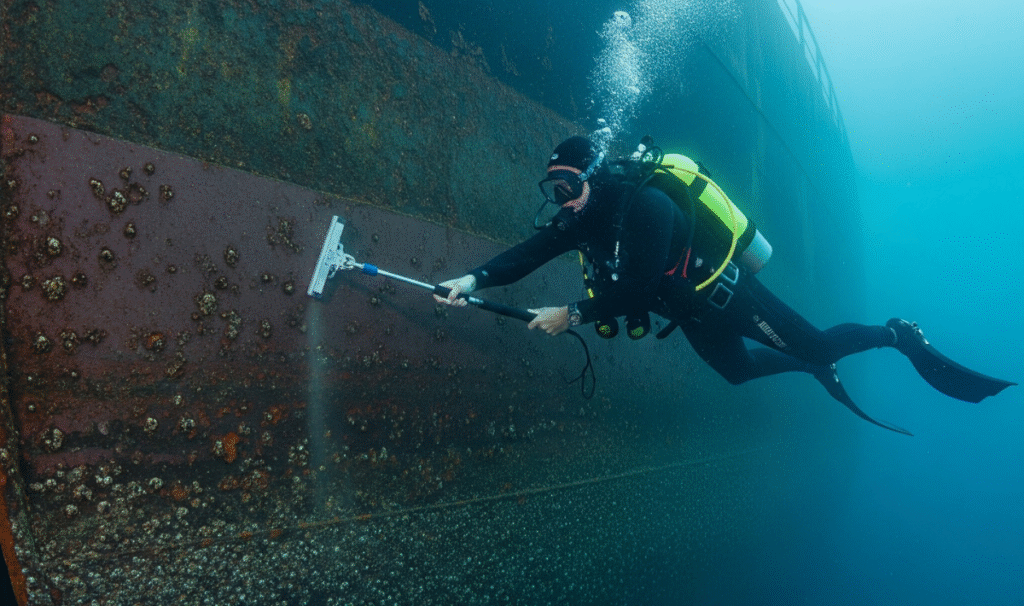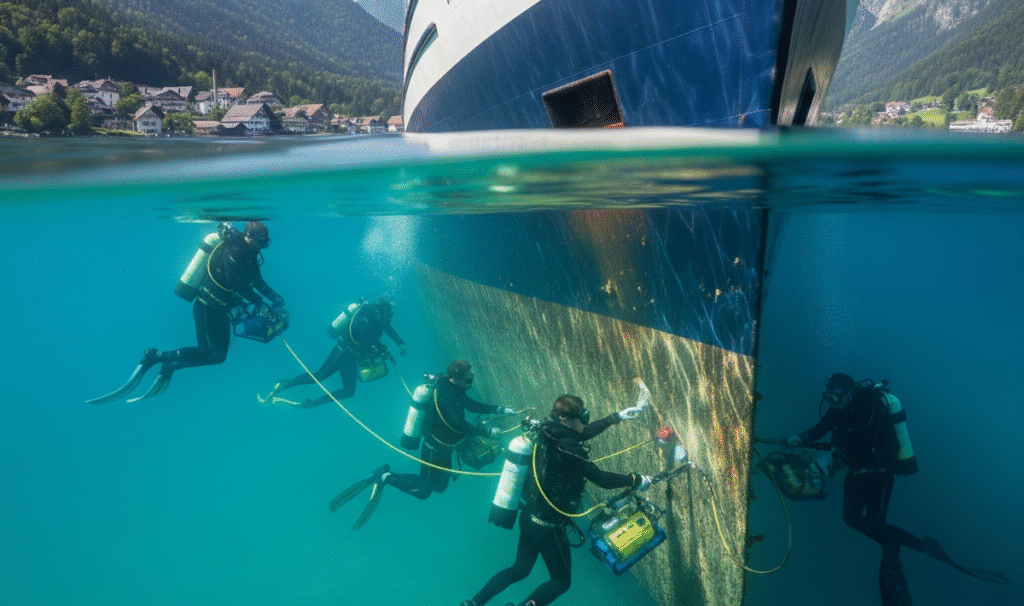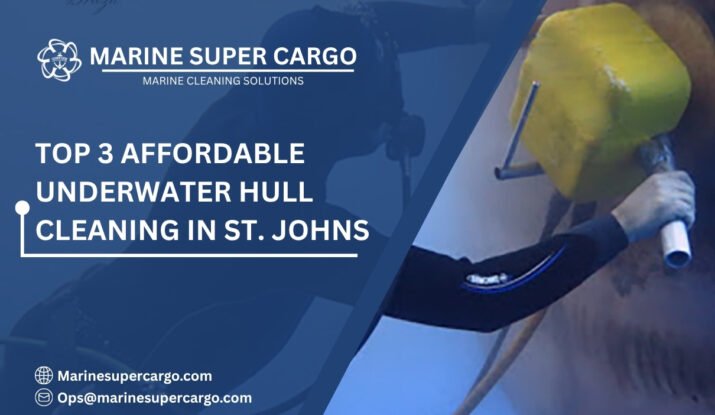Every ship sailing into St. Johns faces a hidden enemy below the waterline: marine growth. Picture your vessel as a marathon runner wearing a thick, muddy suit—no matter how powerful its engine, fouling slows it down, burns more fuel, and risks environmental compliance. That’s where underwater hull cleaning in St. Johns comes in—a key practice that boosts efficiency, protects the environment, and future-proofs your fleet.
This comprehensive, human-friendly guide explores why hull cleaning is critical, how it’s performed, the compliance landscape, its cost-saving impact, innovations in the field, and much more. Let’s dive in and discover how proactive hull care can be your secret weapon in St. Johns.
Why Underwater Hull Cleaning in St. Johns Is Essential
St. Johns is a bustling port city, serving international shipping, offshore oil and gas, and local fishing fleets. With fierce Atlantic tides and active vessel turnover, hulls attract biofouling at an accelerated pace. Delaying underwater hull cleaning in St. Johns is like running with lead weights on your legs—your ship loses speed, efficiency, and environmental credentials.
Understanding the Problem: Biofouling and Its Impact
Biofouling is the gradual accumulation of organisms—algae, slime, barnacles—on underwater surfaces. It increases drag significantly:
- Soft fouling: Slime films and algae, easy to remove but recurring.
- Hard fouling: Barnacles, mussels, and shells, stubborn and damaging.
Unchecked, these layers add serious drag, making your vessel work harder, using up to 30% more fuel per voyage. Underwater hull cleaning in St. Johns helps avoid these losses and ensures your ships compete at their best.

The Technical Side: How Underwater Hull Cleaning in St. Johns Is Done
Inspection and Assessment
Every successful cleaning starts with an inspection—divers or remotely operated vehicles (ROVs) document fouling levels, making precise plans for action.
Cleaning Methods
- Manual Scrubbing: Divers use brushes or pads for fine control and tough spots.
- Robotic or ROV Systems: Machines with rotary brushes, suction, or pressure jets, covering larger surfaces efficiently.
- Waste Capture and Containment: Advanced systems vacuum up removed debris, preventing pollution and curbing the spread of invasive species, as urged by IMO guidelines.
Final Inspection
Post-cleaning checks ensure no damage to coatings and confirm a smooth hull ready for service.
Navigating Regulatory and Compliance Requirements
Regulations are growing sharper every year. Ship operators must heed global and local rules, including:
- IMO Biofouling Guidelines (2023): Stress proactive cleaning while in port, with waste containment, and reporting of both inspections and cleaning results.
- MARPOL Convention: Holds operators accountable for reducing emissions and pollution.
- Local Port Authority Practices: St. Johns has a legacy of marine maintenance, offering certified facilities and setting high standards for hull care.
Choosing professionals who comply with these guidelines isn’t just best practice—it’s essential for operations in St. Johns and worldwide.
Environmental Benefits of Underwater Hull Cleaning in St. Johns
A clean hull benefits more than your bottom line—it’s a win for the ocean. Marine growth increases fuel consumption, which releases more CO₂ and pollutants. By scheduling frequent underwater hull cleaning in St. Johns, you:
- Reduce greenhouse gas emissions for each voyage
- Prevent the transport of invasive marine species to local Newfoundland waters
- Need fewer toxic anti-fouling paints thanks to less frequent reapplication.
It’s the perfect marriage of operational efficiency and environmental responsibility.
National-level insights on pricing are available for underwater ship hull cleaning in Algeria.
The Business Case: Cost Savings for Fleet Operators
Let’s talk numbers. Fuel is a ship operator’s largest running cost. Even modest fouling can spike fuel bills by thousands of dollars for every cruise. Regular underwater hull cleaning in St. Johns delivers:
- Immediate fuel savings from decreased drag
- Longer-lasting and more effective anti-fouling coatings
- Reduced need for dry-docking and emergency repairs
- Fewer compliance penalties and unplanned port delays
In short, keeping hulls clean pays off—fast.
Innovations Shaping the Future of Hull Cleaning
Today’s underwater hull cleaning resembles high-tech engineering as much as classic diving:
- Robotic Cleaners: Using AI and powerful sensors, robots can clean hulls overnight with minimal disruption.
- Eco-Friendly Tools: Soft pads, eco-brushes, and vacuum-suction units minimize risks to hull coatings and local waters.
- Performance Data Integration: IoT sensors and machine learning predict fouling patterns and optimize cleaning schedules, leading to peak vessel performance for every sailing.
The field is evolving, and St. Johns is keeping pace with global best practices.
Risks and Key Considerations
Hull cleaning must be done right. Improper gear can strip protective coatings or let fouling fragments drift into sensitive harbors. Always ensure:
- Only certified professionals with proven safety records work on your ships.
- Waste-capture technologies are used to protect the St. Johns marine ecosystem.
- Operators provide detailed logs, reporting on cleaning action, coatings, and environment.
This diligence ensures underwater hull cleaning in St. Johns is safe, sustainable, and fully compliant.
Best Practices for Ship Owners and Managers
To get the most from underwater hull cleaning in St. Johns:
- Maintain a proactive, data-driven cleaning schedule for each vessel.
- Combine hull cleaning with propeller polishing to maximize gains.
- Log every inspection and cleaning event with provider details, before-and-after images, and results for audits.
- Partner with local providers familiar with St. Johns-specific marine conditions and regulations.

The Future of Underwater Hull Cleaning in St. Johns
As St. Johns continues to grow as a global shipping and energy port, hull care will only become more critical. Expect:
- Wider use of autonomous robotic hull cleaners
- Stricter adherence to IMO, MARPOL, and local regulations
- Enhanced digital tracking for hull performance and environmental compliance
Adopting these forward-thinking solutions will position operators in St. Johns as leaders in both profit and planetary care.
Conclusion
With rising operational costs and tightening regulations, proactive underwater hull cleaning in St. Johns is a strategic investment offering swift rewards. Clean hulls mean faster passages, less fuel burned, lower emissions, and a smaller ecological footprint, all while staying ahead of ever-evolving compliance standards. For ship owners, operators, and managers seeking reliable, long-term performance, partnering with trusted providers like CleanShip.co makes hull cleaning not just an option—but the key to maritime success in St. Johns.
Similar market advantages are discussed in underwater hull cleaning in Argentina.


